第六讲 名词和名词词组
名词和名词词组

专有名词proper noun的数 专有名词一般没有复数形式,除非专有名词 本身带有复数词缀,如the United States,the Philippines, the Netherlands等。 但专有名词有时也可能普通名词化,从而带 有复数词缀,如表示某姓的一家人或同姓或同名 的若干人。如: Have you invited the browns? There are tow Miss Smiths in the class.
The
end
thank
you !!
The statistics__D_that living standards in the area have improved drastically in recent times.(2006.62) A proves B is proving C are proving D prove
Have you ever received _C___of what has happened to her? A a word B words C word D the words 单独的word 表示消息,复数形式表示对骂,a word 表示一句话,如I'll have a word with you. 表我要和你说句话。the word 表特指哪一个消 息或一个单词
名词词组的句法功能(The noun phrase the syntactic function)
名词词组的结构模式:
(限定词)+(前置修饰语)+名词+(后置
修饰语)
( qualifier ) + ( premodifier ) + noun + ( postmodifier )
名词分类和名词词组的句法功能

⑥做介词补足成分
Eg: 1、We teachers should be concerned about the students’ moral culture. 2、Within the house nothing stirs, In the garden I can hear the singing of birds.I can hear the rustle of their wings.
的名词,如armchair、farmland、seaside、 roommate等。
③派生名词:指由动词、形容词、简单名词加 词缀构成的名词,如arrangement、expectation、 ability、greatness等。
2、普通名词和专有名词
英语名词
普通名词
• 个体名词:表示某一类人或物的个体,如boy、house等 • 集体名词:表示由若干个个体组成的集合体,如family、team
⑦做状语和连词
Eg: 1、He returned last night. 2、A photo is taken each time this button is pushed. 3、She phoned her parents the moment she reached the hotel.
名词词组用途广泛,可以在句子中充当主语、 主语补语、宾语、宾语补语、同位语、介词补 足成分、状语和连词;但不能充当谓语成分。
①做主语
Eg: 1、Children at play seldom remember what time it is. 2、The boys quarrelling over the game each insisted that the other was unfair.
名词和名词词组

根据语法特征:countable noun, uncountable noun.
可数名词有单复数形式;不可数名词一般没有单复数之分, 但有时也可以复数的形式出现,表示不同的意义。
Common noun
individual collective material abstract
Proper noun
名词的数:
• 规则复数:(见表P42-44) • 不规则复数: 一部分是通过内部元音变换等方式构成: foot-feet, man-men, goose-geese, woman-women, tooth-teeth, child-children, mouse-mice, ox-oxen. 另一部分是外来词的复数 -um a bacterium-bactria -us i -on a -is es 外来复数形式多用于科技语言,而英语的复数形式 则常见于日常英语。 一些动物名称和某些国人的名称是单复数同形。(P45)
单位词:
• • • • • • 单位词是表示事物个体性的词语。 1. 一般表示个数的单位词 piece, bit, item, article 2.表示形状的: cake, bar, drop, ear, flight, g ain.... 3.表示容积的: bottle, bowl, pail, bucket, glass.... 4.表示动作状态的: fit, peal, flash, display 5.表示成双,成组,成群的:pair, herd, litter, swarm, bench, troupe, pack, shoal, school.
名词和名词词组
分类:
• 根据构词法:simple noun(free morpheme), compound noun(两个或两个以上的自由词素合 成), derivative noun (verb/adj./simple noun +affixs) • according to the lexical meaning: common noun, proper noun. • common noun: 表示同一类的人或物的名称(包 括抽象概念) individual, collective, material, • abstract • proper noun: 表示个人、国家、地方、机构、组 织等的专有名称
4.名词和名词词组
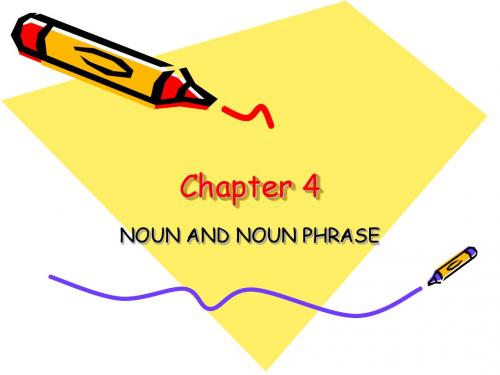
NOUN AND NOUN PHRASE
4.0 名词分类
proper nouns 专有名词 Individual nouns 个体名词
Nouns 名词
common nouns 普通名词
Collective nouns 集体名词 mass nouns 物质名词 Abstract nouns 抽象名词
2.3 物质名词、抽象名词和专有名词的数
1) 物质名词
物质名词指名词本身时,常作不可数名词。 如: water, oil, electricity, air, dust, tobacco. The air here is heavily polluted. 这里的 空气被严重污染。 物质名词用来表示具体、个别情况时常作 可数名词。如: Some of these kinds of tobacco are also grown in my hometown. 这些品种的烤烟 我的家乡也有种植。
4)以辅音加-o结尾的,加-es。如
tomato ____tomatoes echo ____echoes potato ___ potatoes hero ___heroes Negro ____Negroes 但是,piano, photo, dynamo(发电机)等外来词只 加-s,而zero, mosquito(蚊子)既可加-s又可加-es。
下面是一些这一类的复合词:
American cloth 做台布用的彩色防水布 American plan 旅馆之供膳制 British warm 英国军官穿的双排钮扣的短大衣 Dutch comfort 退一步着想而得到的安慰 Dutch courage 酒后之勇,一时的虚勇 Dutch door 上下两部分可各自分别开关的门;杂志中的夹页广告 Dutch treat 各人自己付钱的聚餐或娱乐 Dutch uncle 啼啼叨叨训人的人 Dutch wife 藤或竹制的睡眠用具 French leave 不告而别 French chalk 滑石粉 French dressing 一种由橄榄油,醋、盐,香料等制成的生菜调味品 French grey 浅灰色 French window 落地长窗 German measles 风疹
名次与名词词组

课堂练习
1.George Stamp, the novelist, will be the Guest of Honors at our next dinner. 2. We chose John Spratt captain. 3. Her father gave her just what she wanted ,a silk scarf. 4.He came home last night. 5. The teacher who taught the class found the new student sitting in the corner of the classroom a very attentive boy.
名词词组句法功能之重难点
1.作为名词中心词的修饰语,形容词一般是前置的。但当中心词是由-body, 作为名词中心词的修饰语,形容词一般是前置的。但当中心词是由 作为名词中心词的修饰语 one, -thing结尾的复合不定代词时,它们的修饰语(包括形容词或形容词词组 结尾的复合不定代词时, 结尾的复合不定代词时 它们的修饰语( 在内)只能后置。例如: 在内)只能后置。例如: Anyone intelligent can do it. Is there anything easier than this? 2.有些形容词用作名词中心词的修饰语,可前置,也可后置,但意义不同。例 有些形容词用作名词中心词的修饰语,可前置,也可后置,但意义不同。 有些形容词用作名词中心词的修饰语 如: The present situation concerns all students present. (The present situation = the situation now; students present = those who are here) ) 3.在有些结构中,形容词可前置也可后置,意义不变。例如: 在有些结构中,形容词可前置也可后置,意义不变。例如: 在有些结构中 This is the finest cloth obtainable ( = the finest obtainable cloth ) 4.有时由于受到结构的限制,形容词只能后置。例如: 有时由于受到结构的限制,形容词只能后置。例如: 有时由于受到结构的限制 Any boy brave enough to swim in that sea deserves a medal.
英语名词和名词词组
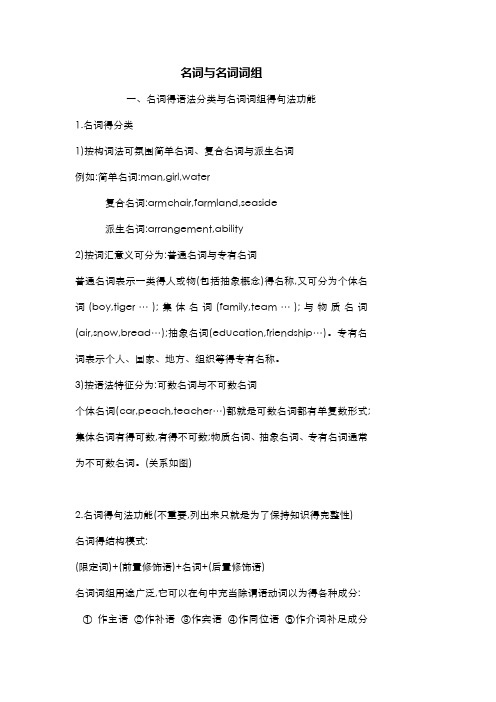
名词与名词词组一、名词得语法分类与名词词组得句法功能1.名词得分类1)按构词法可氛围简单名词、复合名词与派生名词例如:简单名词:man,girl,water复合名词:armchair,farmland,seaside派生名词:arrangement,ability2)按词汇意义可分为:普通名词与专有名词普通名词表示一类得人或物(包括抽象概念)得名称,又可分为个体名词(boy,tiger…);集体名词(family,team…);与物质名词(air,snow,bread…);抽象名词(education,friendship…)。
专有名词表示个人、国家、地方、组织等得专有名称。
3)按语法特征分为:可数名词与不可数名词个体名词(car,peach,teacher…)都就是可数名词都有单复数形式;集体名词有得可数,有得不可数;物质名词、抽象名词、专有名词通常为不可数名词。
(关系如图)2.名词得句法功能(不重要,列出来只就是为了保持知识得完整性)名词得结构模式:(限定词)+(前置修饰语)+名词+(后置修饰语)名词词组用途广泛,它可以在句中充当除谓语动词以为得各种成分: ①作主语②作补语③作宾语④作同位语⑤作介词补足成分⑥作状语与连词二、名词得数1.不可数名词:1)不可数名词没有单复数之分,它包括抽象名词、物质名词与专有名词。
例如:health,advice,glass,wood,English注意:不可数名词表示个体时,须用单位名词(量词)常用得单位名词有:a piece of,an article of,a bar of,a loaf of, a bottle of, a head of…2)以ics结尾得表示学科名称得名词一般用作单数。
例如:mathematics,physics…但表示学科以外得其她意义,可用作复数例如:mathematics有时候也表示运算能力得意义3)某些以s结尾指单一事物得专有名词常作单数。
软件工程 第六讲 结构化分析方法

什么是GOTO语句?
ห้องสมุดไป่ตู้
在以前的程序设计课程中,老师说 goto语句很重要,为什么在这里说不 那么重要呢?
简单明确的概述什么是自顶向下、逐步求 精的思想,它和自底向上的分析方法有什 么不同??
结构化设计程序的方法在软件工程提出后产生, 主要是提出取消“GOTO“语句的使用。我想问的 是在结构化中的模块之间的接口不就算是 “GOTO”语句吗? 问题一:书中104在讲到结构化程序设计(SP)中 提到的“只要三种控制结构(顺序、选择、重复) 就是能表达用一个入口和一个出口的流程图所能 表达的任何程序逻辑”该做如何理解? 问题二:该如何来理解结构化方法的指导思想 (自顶向下、逐步求精)与两个基本原则(抽象、 分解)的联系?
问题六:基本加工是靠自己的经验来确定的,还 是有一定的标准?
返回
数据流
表示数据的流向。 数据流由一组数据项组成。 命名规则和注意事项:
数据流的名字用名词或名词词组 应尽量使用现实系统中已有的名字 把现实环境中传递的一组数据中最重要的那个数据的名字作为数 据流的名字 不要把控制流作为数据流 不要使用意义空洞的名词作为数据流名,如”数据“、“信息 “等。 如果在命名时遇到困难,说明你可能对数据流的分解不恰当,应 进行重新分解。 对流进或流出文件的数据流不需标注名字。
问题P110 怎样准确的判断出父图与子图的平 衡?
父图 与子 图平 衡吗?
父图 与子 图平 衡吗?
问题
110页图8.6为什么平衡不清楚。 P110 对父图与子图的平衡的理解:图8.6中如果 不存在图8.4的情况下,那么这个父图与子图就不 符合自图的平衡了,对吗? 画数据流图中,父图与子图怎样保持平衡? P110:第(6)个注意事项第二段第一句:有时考 虑平衡可忽略一些枝节性的数据流。我对本句中 的“枝节性的数据流”不太理解,不知道什么叫 “枝节性的数据流”,枝节性的数据流有何特点?
名词和名词词组.ppt

单复同形,如:
某些动物:deer, sheep, fish等。 某些国家人的名称:Chinese, Japanese等
附表:不同国家的人的单复数
名称
总称(谓语用复数)
中国人
the Chinese
瑞士人
the Swiss
澳大利亚人 the Australians
2)集体名词、物质名词、抽象名 词、专有名词的数
a)集体名词的数
集体名词有的能计数有的不能计数,用法比较复杂。比如有些集
体名词本身没有复数形式,如果要计数,就得使用在语义上与之 对应的个体名词。如:
集体名词
个体名词
poetry
poem
machinery
machine
clothing
garment, coat, etc.
d)专有名词的数
专有名词一般没有复数,除非专有名词本身带有复数 词缀,如: the United States, the Philippines, the Netherlands等。但专有名词也可能普通名词化,从 而有复数的形式,如表示某姓的一家人或表示不同姓 或同名的几个人。如:
Have you invited the Browns? (姓布朗的一家人etc.
也有一些集体名词本身可以用于个体意义,从而有单、复数形式。
如:team, committee, family等。用作单数时强调整体,用作复数 指构成集体的成员。
b)物质名词的数
物质名词一般是不可数名词,没有单、复数之 分。可是有些物质名词有时也有复数形式,但 意义不同。如sand, sands指大面积的沙滩; water, waters指大面积的水域;food, foods指多 种食品;coffee, two coffees指两杯咖啡。
初中英语知识点归纳常见的名词和名词词组
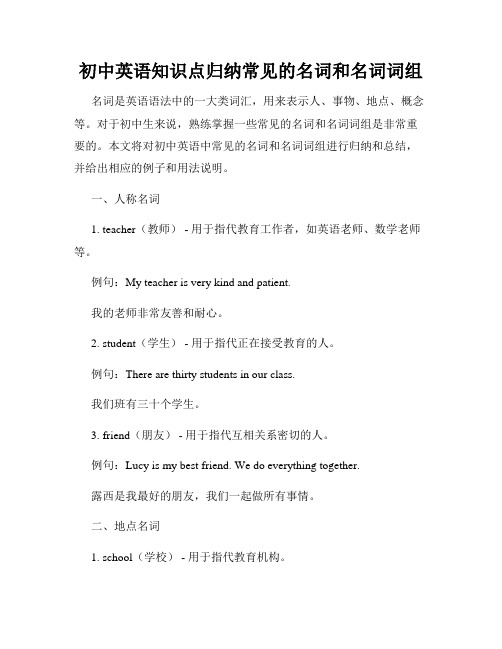
初中英语知识点归纳常见的名词和名词词组名词是英语语法中的一大类词汇,用来表示人、事物、地点、概念等。
对于初中生来说,熟练掌握一些常见的名词和名词词组是非常重要的。
本文将对初中英语中常见的名词和名词词组进行归纳和总结,并给出相应的例子和用法说明。
一、人称名词1. teacher(教师) - 用于指代教育工作者,如英语老师、数学老师等。
例句:My teacher is very kind and patient.我的老师非常友善和耐心。
2. student(学生) - 用于指代正在接受教育的人。
例句:There are thirty students in our class.我们班有三十个学生。
3. friend(朋友) - 用于指代互相关系密切的人。
例句:Lucy is my best friend. We do everything together.露西是我最好的朋友,我们一起做所有事情。
二、地点名词1. school(学校) - 用于指代教育机构。
例句:I go to school from Monday to Friday.我从周一到周五上学。
2. park(公园) - 用于指代供人们休闲、娱乐的场所。
例句:I like to play basketball in the park with my friends.我喜欢和朋友们在公园里打篮球。
三、物体名词1. book(书籍) - 用于指代用纸张制作的阅读材料。
例句:I borrowed a book from the library yesterday.昨天我从图书馆借了一本书。
2. pen(钢笔) - 用于指代用于写字的工具。
例句:Can I borrow your pen? I forgot mine at home.我可以借用你的钢笔吗?我把我的忘在家里了。
四、抽象名词1. love(爱) - 用于表示深情和关心。
例句:I love my family very much.我非常爱我的家人。
名词分类和名词词组的句法功能 ppt课件

名词分类和名词词组的句法功能
②复合名词:由两个或两个以上自由词素合 成的名词,如armchair、farmland、seaside、 roommate等。
③派生名词:指由动词、形容词、简单名词 加词缀构成的名词,如arrangement、 expectation、ability、greatness等。
名词分类和名词词组的句法功能
名词分类和名词词组的句法功能
①可数名词有单、复数形式;不可数名词一 般没有单、复数之分,但有时也可以以复数形 式出现,表示不同意义。
②个体名词都是可数名词,有单、复数形式, 可以计数;比如说a car,two cars,one peach, ten peaches;集体名词有的可数,有的不可数, 比如说a family,two families,却不可以说a furniture,two furnitures;物质名词、抽象名词 和专有名词通常不可以计数,从而是不可数名 词。
Eg: 1、Mr Brown,director of the coal mine,should be responsible for the accident. 2、Alice,a professor of the department,will be invited to our English evening.
名词分类和名词词组的句法功能
Eg: 1、We teachers should be concerned about the students’ moral culture. 2、Within the house nothing stirs, In the garden I can hear the singing of birds.I can hear the rustle of their wings.
名词和名词词组英语课件
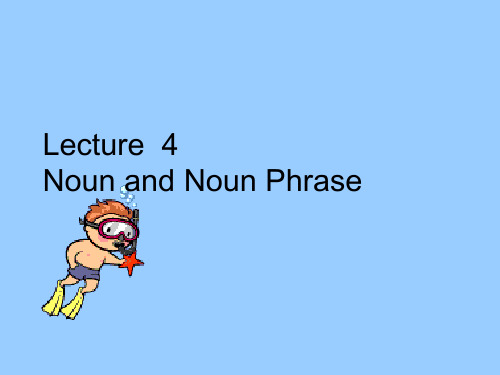
• Irregular plurals also include some words of foreign origin, borrowed from Greek, Latin or French. Their plural forms are known as “foreign plurals”, e.g. basis—bases, criterion— criteria. • Some borrowed words have two plural forms: a foreign plural and an English one. • e.g. medium—media – mediums • For some, their singular and plural number share the same form,
4.2 Number forms of nouns
• Number is a grammatical distinction which determines whether a noun or determiner is singular or plural. • 1) Regular and irregular plural • The regular is formed by adding –s or –es to the base, while the irregular is formed by changing the internal vowel or by changing the ending of the noun.
• The general pattern of noun phrase is (determiner)+(premodifier)+noun+(postmodifier) The premodifier of noun phrase can be noun as well as adj. or participle. e.g. a table leg, water supply, the life sciences When noun is used as premodifier, it can be either singular, plural, or both. (1) Singular noun as premodifier e.g. table legs = legs of a table / tables a shoe store = a store that sells shoes a car race = a race between cars
英语 名词+名词 语法
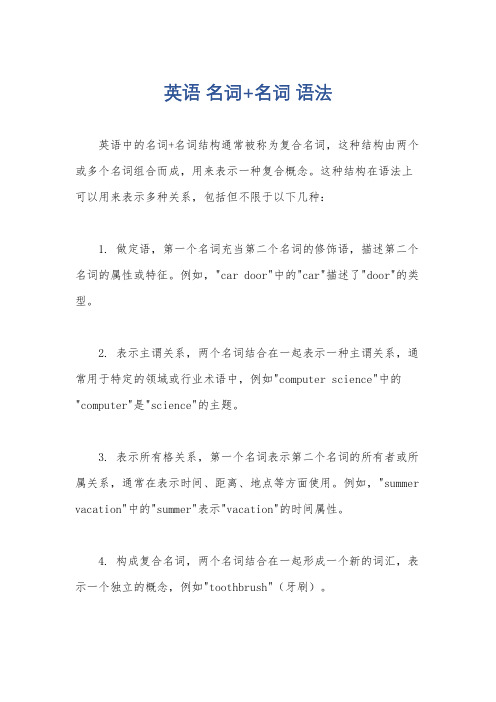
英语名词+名词语法
英语中的名词+名词结构通常被称为复合名词,这种结构由两个或多个名词组合而成,用来表示一种复合概念。
这种结构在语法上可以用来表示多种关系,包括但不限于以下几种:
1. 做定语,第一个名词充当第二个名词的修饰语,描述第二个名词的属性或特征。
例如,"car door"中的"car"描述了"door"的类型。
2. 表示主谓关系,两个名词结合在一起表示一种主谓关系,通常用于特定的领域或行业术语中,例如"computer science"中的"computer"是"science"的主题。
3. 表示所有格关系,第一个名词表示第二个名词的所有者或所属关系,通常在表示时间、距离、地点等方面使用。
例如,"summer vacation"中的"summer"表示"vacation"的时间属性。
4. 构成复合名词,两个名词结合在一起形成一个新的词汇,表示一个独立的概念,例如"toothbrush"(牙刷)。
在英语中,名词+名词结构的使用非常灵活,可以根据具体语境和需求来灵活运用,表达丰富的语义和逻辑关系。
这种结构在英语写作和口语表达中都有广泛的应用,能够丰富语言表达的层次和丰富度。
总的来说,名词+名词结构在英语语法中扮演着重要的角色,对于理解和运用英语语言具有重要意义。
名词分类和名词词组的句法功能

③做宾语
Eg: 1、They gave him a first-rate education. 2、In the hall,I saw some extremely valuable pictures.
④做宾语补语
Eg: 1、They elected him chairman of the board. 2、The School Board have appointed her superintendent of the city’s schools.
a lovely little boy
a most lovely little boy
play
a most lovely little boy at
red at play
a most lovely little boy in
SUCCESS
THANK YOU
2019/7/11
名词词组用途广泛,可以在句子中充当主语、 主语补语、宾语、宾语补语、同位语、介词补 足成分、状语和连词;但不能充当谓语成分。
合成的名词,如armchair、farmland、seaside、 roommate等。
③派生名词:指由动词、形容词、简单名 词加词缀构成的名词,如arrangement、 expectation、ability、greatness等。
2、普通名词和专有名词
英语名词
普通名词
• 个体名词:表示某一类人或物的个体,如boy、house等 • 集体名词:表示由若干个个体组成的集合体,如family、team
THANK YOU
2019/7/11
名词分类和名词词组的句法功能
外国语14级1 班
蔡秋梅
主要内容
名词及名词词组

the United States, the Netherlands,
physics,
mechanics,
optics,
linguistics
2021/4/9
14
4.2.4 复数名词做定语
a book store → two book stores But: a woman doctor → two women doctors; a gentleman farmer → three gentlemen farmers
The present government, which hasn’t been in power long, is trying to control inflation. It isn’t having much success.
The government, who are looking for a quick victory, are calling for a general election soon. They expect to be re-elected. A lot of people are giving them their support.
2021/4/9
8
4.1.2 Classification in terms of lexical meaning
Common noun
Individual nounstudent, Collective nounpeople Material nounbook Abstract nounbeauty
2021/4/9
15
4.2.4 复数名词做定语
Noun adjectives That iron door is for the center building. The glass windows let in the morning sun.
英语语法,名词和名词词组
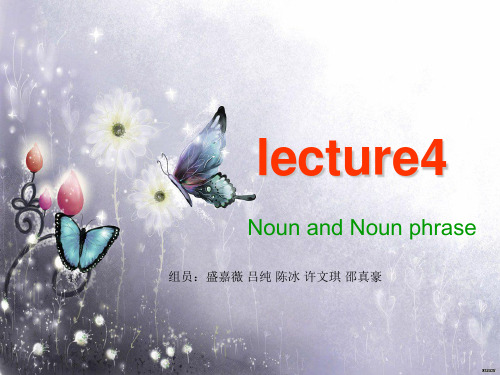
• 3.Partitives of volume • like:a bottle of ink a cup of tea : • 4.Partitives related to the state of action • Like : a fit of anger a flash of hope • 5.Partitives denoting pairs,groups,flocks,ect • Like:a pair of shoes a group of people : a bench of judges
lecture4
Noun and Noun phrase
组员:盛嘉薇 吕纯 陈冰 许文琪 邵真豪
We will talk about
• • • • 1.Classification of nouns 2.Number forms of nouns 3.Partitives 4.Functions of noun phrases
1.Classification of nouns
• Word formation • Lexical meaning • Grammatical meaning
名词词组
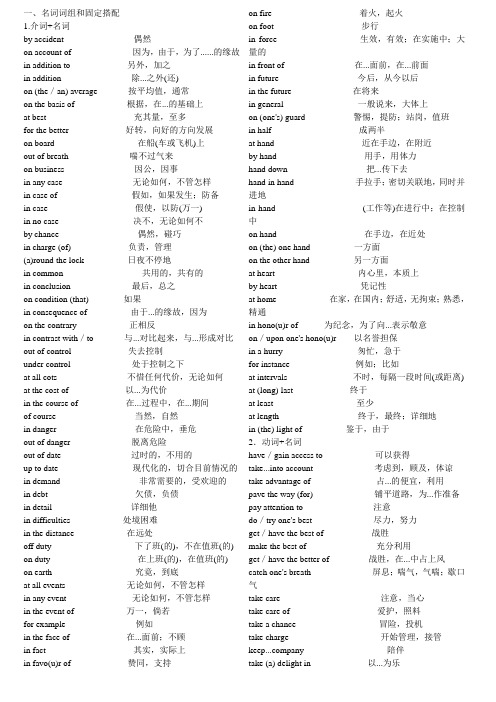
一、名词词组和固定搭配1.介词+名词by accident 偶然on account of 因为,由于,为了......的缘故in addition to 另外,加之in addition 除...之外(还)on (the/an) average 按平均值,通常on the basis of 根据,在...的基础上at best 充其量,至多for the better 好转,向好的方向发展on board 在船(车或飞机)上out of breath 喘不过气来on business 因公,因事in any case 无论如何,不管怎样in case of 假如,如果发生;防备in case 假使,以防(万一)in no case 决不,无论如何不by chance 偶然,碰巧in charge (of) 负责,管理(a)round the lock 日夜不停地in common 共用的,共有的in conclusion 最后,总之on condition (that) 如果in consequence of 由于...的缘故,因为on the contrary 正相反in contrast with/to 与...对比起来,与...形成对比out of control 失去控制under control 处于控制之下at all cots 不惜任何代价,无论如何at the cost of 以...为代价in the course of 在...过程中,在...期间of course 当然,自然in danger 在危险中,垂危out of danger 脱离危险out of date 过时的,不用的up to date 现代化的,切合目前情况的in demand 非常需要的,受欢迎的in debt 欠债,负债in detail 详细他in difficulties 处境困难in the distance 在远处off duty 下了班(的),不在值班(的) on duty 在上班(的),在值班(的) on earth 究竟,到底at all events 无论如何,不管怎样in any event 无论如何,不管怎样in the event of 万一,倘若for example 例如in the face of 在...面前;不顾in fact 其实,实际上in favo(u)r of 赞同,支持on fire 着火,起火on foot 步行in force 生效,有效;在实施中;大量的in front of 在...面前,在...前面in future 今后,从今以后in the future 在将来in general 一般说来,大体上on (one's) guard 警惕,提防;站岗,值班in half 成两半at hand 近在手边,在附近by hand 用手,用体力hand down 把...传下去hand in hand 手拉手;密切关联地,同时并进地in hand (工作等)在进行中;在控制中on hand 在手边,在近处on (the) one hand 一方面on the other hand 另一方面at heart 内心里,本质上by heart 凭记性at home 在家,在国内;舒适,无拘束;熟悉,精通in hono(u)r of 为纪念,为了向...表示敬意on/upon one's hono(u)r 以名誉担保in a hurry 匆忙,急于for instance 例如;比如at intervals 不时,每隔一段时间(或距离) at (long) last 终于at least 至少at length 终于,最终;详细地in (the) light of 鉴于,由于2.动词+名词have/gain access to 可以获得take...into account 考虑到,顾及,体谅take advantage of 占...的便宜,利用pave the way (for) 铺平道路,为...作准备pay attention to 注意do/try one's best 尽力,努力get/have the best of 战胜make the best of 充分利用get/have the better of 战胜,在...中占上风catch one's breath 屏息;喘气,气喘;歇口气take care 注意,当心take care of 爱护,照料take a chance 冒险,投机take charge 开始管理,接管pany 陪伴take (a) delight in 以...为乐make a difference 有影响,起(重要)作用carry/bring/put into effect 使生效,实行,实现come/go into effect 生效,实施take effect 生效,起作用catch sb's eye 被某人看到,引起某人注意keep an eye on 留神,照看,密切注意make a face 做鬼脸find fault with 抱怨,挑剔,找岔子catch (on) fire 着火,开始燃烧make fiends (with) 与(...)交朋友be friends with 与...友好make fun of 取笑,拿...开玩笑keep sb's head 保持镇静in the world 究竟,到底lose sb's head 慌乱,仓皇失措lose heart 丧失勇气,失去信心get/catch/take hold of 抓住,得到keep house 管理家务throw/cast light on/upon 使人了解,阐明bear/keep in mind 记住have in mind 考虑到,想到make up one's mind 下定决心,打定主意bring/put into operation 实施,使生效,使运行come/go into operation 施行,实行,生效keep pace (with) 与(...)齐步前进,与(...)并驾齐驱play a part (in) 起作用,参与,扮演角色take place 发生,进行,举行take the place of 代替,取代put into practice 实施,实行make progress 进步,进展give rise to 引起,导致为...的原因make sense 讲得通,有意义,言之有理catch sight of 发现,突然看见(go) on the stage 当演员take one's time 不着急,不慌忙keep track of 与...保持联系lose track of 失去与...的联系,不能跟上...的进展make use of 利用put to use 使用give way 让路;屈服,让步;倒塌,坍陷make one's way 前往,行进,去make way 让路,腾出地方或位置3.名词词组的其他形式appeal to 呼吁,恳求attempt at 企图,努力attitude to/towards 态度,看法a great/good deal of 大量,非常,极其influence in 干涉,介入interference with 妨碍,打扰introduction to 介绍a lot (of) 许多(的),大量(的)lots of 大量,许多fall in love (with sb) 爱上(某人)reply to 回答,答复trolley bus 电车I.D. card 身份证credit card 信用卡no doubt 无疑地,很可能next door 隔壁out of doors 在户外face to face 面对面地a few 有些,几个quite a few 不少,相当多a little 一点,一些little by little 逐渐地,一点点地quite a little 相当多,不少no matter 无论the moment (that) 一...(就)no more 不再fair play 公平竞赛,公平对待rest room 厕所,盥洗室primary school 小学side by side 肩并肩地,一起heart and soul 全心全意step by step 逐步地ahead of time 提前all the time 一直,始终once upon a time 从前once in a while 偶尔no wonder 难怪,并不奇怪word for word 逐字地decline with thanks 婉言谢绝二、动词词组和固定搭配1.动词十介词/副词account for 说明...的原因,是...的原因allow for 考虑到,顾及,为...留出预地appeal to 诉诸,诉请裁决(或证实等)arrive at 达成,达成ask after 探问,问起ask for 请求,要求attach to 附属于,隶属于;使依恋,使喜爱to begin with 首先,第一break down 损坏;(健康等)垮掉,崩溃break in 非法闯入;打断,插嘴break into 非法闯入,强行进入break off 中断,突然停止break out 逃脱,逃走;突然出现,爆发break through 突破,冲破;取得突破陛成就break up 印终止,结束;打碎,粉碎;散开,驱散bring about 导致,引起bring down 使落下,打倒;降低,减少bring forth 产生,提出bring forward 提出,提议;提前bring out 使显出;激起,引起;出版,推出bring to 使恢复知觉bring up 教养,养育;提出build up 逐渐积聚,集结;逐步建立;增进,增强burn out 烧光,烧毁...的内部;熄灭burn up 烧掉,烧毁;烧起来,旺起来;(使)发怒call for 叫(某人)来;要求,需要call off 取消call on/up 访问,拜访;号召,要求call up 召集;使人想起;打电话(给)care for 照顾,照料;喜欢carry off 夺走,拿走carry on 继续,进行carry out 实行,执行;实现,完成catch at 试图抓住,拼命抓catch on 理解,懂得;流行起来check in (在旅馆、机场等)登记,报到check out 结帐后离开,办妥手续离去check up (on) 检查,核实cheer up (使)高兴起来,(使)振作起来•clear away 把...清除掉,收拾clear up 清理;澄清,解决;(天)放晴come off 脱落,分开;结果,表现come on [表示鼓励、催促等]快,走吧;开始,发生;进步,进展come out 发表,出版;出现,显露;结果是come round(around) 顺便来访;苏醒,复原come through 经历...仍活着,安然度过come to 苏醒;涉及,谈到;总数为,结果是come up 走上前来;发生,出现count on/upon 依靠,指望count up 共计,算出...的总数cover up 掩饰,掩盖;盖住,裹住cross off/out 划掉,勾销cut across 抄近路穿过,对直通过cut back 削减,缩减;急忙返回cut down 削减,减少;杀死,砍倒cut in 超车抢挡;插嘴,打断cut off 切断,阻碍;使分离,使隔绝cut out 删去,切去;戒除,停止ⅡB用cut short 中断,打断deal with 处理,对付;论述,涉及deep down 实际上,在心底die down 逐渐消失,变弱die out 逐渐消失,灭绝do without 没有...也行,用不着,将就draw in (火车、汽车)到站;(天)渐黑,(白昼)渐短draw up 起草,拟订;(使)停住dress up 穿上盛装,精心打扮;装饰,修饰drop by/in 顺便(或偶然)访问drop off 下降,减少;睡着,入睡;让(...)下车,把...放下drop out 退出,退学dry out (使)干透dry up (使)干透,(使)干涸;(使)枯竭fall behind 落后,落在...的后面[/Post]fall through 落空,成为泡影fall in 填满;填写;(for)替代fall out 填写;长胖,变丰满find out 查明,找出,发现get across (将...)清楚,(使)被了解get around/round 走动,克服,设法回避(问题等);(协)抽出时间来做(或考虑)get at 够得着,触及;意思是,意指;查明,发现;指责get away 逃脱;走开,离开;(iwth)做了(坏事)而逃脱责罚get by 通过;过得去,(勉强)过活get down (从...)下来;写下;使沮丧;(to)开始认真做,着手做get in 进入,抵达;收获(庄稼等);(证th)对...亲近get into (使)进入;卷入;对...发生兴趣get off (从...)下来;动身,出发;下班,结束(工作);逃脱惩罚get over 克服,解决(问题等);(从疾病、失望等)中恢复过来get through 度过(时间);(使)通过(考试),(使)(议案等)获得通过;(将...)讲清楚,完成;接通电话get together 相聚,聚集get up 起床;起立give away 泄露;赠送give back (归)还give in 交上,呈上;投降,屈服,认输give off 发出(光、声音等),散发出(气味) give out 分发;用完;消耗尽;发出(光、声音)give up 停止,放弃;(oneself)自首go after 追求,追赶go ahead 开始;进行go by 遵守,遵循,依据;(时间)过去go down 下降,减少;(船)沉没,(日)落;(with)生...病;(well或badly)(不)受欢迎,(不)被接受go for 袭击;适用于;选择,想要获得;喜爱go into 进入,参加;开始从事;研究,调查go off 爆炸,开火,突然响起;(电等)中断,停止;不再喜欢go out 外出(尤指参加社会活动);过时;(潮)退,(灯)熄,终止;送出,公布,播出go over 仔细检查,察看;复习,重做go round/around 足够分配;(with)常...与交往;流传;四处走动,到处活动go through 经历,遭受;详细检查,查找,详细讨论;获得通过,被批准;(with)将...干到底go under 沉没;失败;破产go up 上升,上涨,增长;正在建设中;烧毁,炸毁go with 跟...相配;与...相伴;附属于go without 没有hand down 把...传下去hand in 交上,递交hand on 把...传下去hand out 分发,散发hand over 交出,移交hang about/around 闲荡,闲呆着hang on 坚持,抓紧,不放;等待片刻,(打电话时)不挂断;有赖于;取决于hang up 挂断(电话):悬挂,挂起have on 穿着,戴着hold back 踌躇,退缩;阻止,抑制;隐瞒,保守(秘密等)hold on 坚持住,握住不放;(打电话时)不挂断,等-会hold out 维持,保持;坚持(要求),不屈服hold up 支持,支撑,延迟;抢劫;展示,举出hurry up (使)赶陕,匆匆完成improve on/upon 改进;胜过keep back 阻止,抑制;隐瞒,保留keep off (使)不接近,(使)让开keep to 遵守,信守;坚持keep up 保持,(使)继续下去;使居高不下let down 放下,降低;使失望let off 宽恕,放过;开(枪),放(炮、烟火等)州)放let out 放走,释放;泄露,放出,发出lie in (问题、事情等)在于line up (使)排队,(使)排成行live on 靠...生活,以...为食物live through 度过,经受住live up to 符合,不辜负(期望);遵守,实践(诺言、原则等)look after 照管,照料,照料;注意,关心look at 看,朝...看;考虑,研究;看待look back (on) 回顾,回忆;回头看look for 寻找,寻求;惹来,招来look in 顺便看望,顺便访问look into 调查,观察look on 旁观,观看look out (for) 留神,注意look over 把...看一遍,把...过目;察看,参观look through 详尽核查;(从头至尾)浏览look up 好转;(在词典等中)查找;看望,拜访:(to)尊敬make for 走向,朝...前进;有助于,促进make out 辨认出,看出;理解,了解;写出,开出make up 印构成,组成;(为...)化妆;补充,补足;和解,重归于好;捏造,临时编造,虚mix up 混淆,弄混,弄乱occur to 被想到,被想起pass away 去世pass (as) 充作,被看作,被当作pass out 失去知觉,昏倒pay back 偿还,还钱给(某人);向...报复,回报pay off 还清(债);付清工资解雇(某人);向...行贿;得到好结果,取得成功pay up 全部付清pick out 选出,挑出,拣出;辨认出,分辨出pick up 拿起,捡起;取(给),用车接载(人);好转,改进,增加(速度);(使)重新开始,继续;获得,学会pull down 拆毁pull in (车)停下,车进站,船(到岸)pull off 脱去,扯下;(成功地)完成pull out 拔出,抽出,取出;(车、船)驶出;(使)摆脱困境pull together 齐心协力,团结起来pull up (使)停下put across/over 解释清楚,使被理解put aside 储存,保留;暂不考虑,把...放在一边put away 放好,收好put in 花费,付出(时间、精力等);申请,正式提出put on 穿上,戴上;上演;增加(体重)put out 熄灭,关(灯);出版,发布;生产;伸出put up 建造,支起,搭起;张贴;进行(抵抗等);提供,提名,提出;提高(价格、速度);为...提供食宿,投宿refer to 参考,查阅;涉及,提到;指的是ring off 挂断电话run down 撞倒;说...坏话,贬低;停止运转,耗尽;减少,缩减;查找出,搜索到run into 偶然碰见;遭遇(困难等);共计,达到...之多;撞在...上run off 很快写出;复印出,印出;跑掉,逃掉run over 在...上驶过,(撞倒并)碾过;把...很快地(或粗略地)过一遍see off 为...送行see through 看透,识破see to 注意,照料send for 派人去请,召唤;函购,函索send in 呈报,递送,提交set aside 留出,拨出(时间、金钱等);把...置于一旁,不理会set back 推迟,延缓,阻碍;使花费set down 记下,写下set forth 阐明,陈述set off 出发,启程;引起,激起set out 陈述,阐明;动身,起程;开始;摆放set up 创立,建立,为...作准备;竖立,架起,建造;开业,开始经商show off 炫耀,卖弄show up 显露,暴露;露面,来到shut out 把...排斥在外sit in on 列席(会议),旁听sit up 不睡,熬皮;坐直speed up (使)加快速度stand by 站在...一边,支持,帮助;袖手旁观;坚持(决议等),遵守(诺言等);作好准备,准备行动stand for 代替,代表,意味着,主张,支持;[用于否定、疑问句]容忍,接受stand out 清晰地显出,引人注目;杰出,出色stand up 站起来;(论点、证据等)站得住脚step up 提高,加快,加紧stick out (把...)坚持到底;突出,显眼stick to 坚持,忠于,信守;紧跟,紧随;粘贴在...上take after (在外貌、性格等方面)与(父、母等)相像take away 减去take down 拆卸;记下,写下take...for 把...认为是,把...看成是take in 接受,吸收,接纳;理解,领会;欺骗;包括take off 脱下;起飞;匆匆离开take on开始雇用;呈现,具有;同...较量,接受...的挑战;承担,从事take over 接受,接管;借用,承袭take to 对...产生好感,开始喜欢;形成...的习惯,开始从事take up with 与...成朋友take up 开始从事;把...继续下去;着手处理;占去,占据;(on)接受邀请think over 仔细考虑throw away 扔掉,抛弃;错过(机会),浪费(金钱等)touch on/upon 谈到,论及turn down 关小,调低;拒绝turn in 交还,上交;上床睡觉turn off 关掉;拐弯,离开...转入另一条路turn on 接通,打开turn out 制造,生产;结果是;驱逐;关掉,旋熄turn over 翻过来,翻倒;移交,交;仔细考虑turn to 查阅;求助于,求教于turn up 开大,调大;出现,来到use up 用完,用光warm up (使)暖起来;(使)活跃起来,(使)热情起来;(使)作准备活动,(使)热身wear off 逐渐消失;渐渐减少wear out 穿破,磨损,用坏;(使)疲乏,(使)厌卷,(使)耗尽while away 消磨<时间)wipe out 擦净,擦掉;彻底摧毁,消灭work at/on 从事于,努力做work out 解决;算出;弄懂,理解;想出,制定出work up 激发,激起;制订出,精心作出write off 取消,勾销,注销2.后接动名词的动词搭配aim at 目的在于,旨在;瞄准;企图accuse...Of... 控告;谴责,depend on 取决于,视...而定;依靠,依赖;信赖,相信devote to 将...奉献给;把...专用(于)engage in 从事于,参加feel like 想要go on 时间)过去;灯亮;开始运行;继续,接着;进行,发生cannot/couldn't help 禁不住;不得不insist on 坚持,强调,坚决要求keep from 阻止,抑制keep up 继续进行、继续下去look forward 曲协盼望,期待persist in 坚持不懈,执着prevent from 预防,防止put off 推迟,推延;阻止,劝阻set about 开始,着手succeed in 成功thank for 感谢think of 想起,记得;想出,提出;考虑,关心3.其他动词词组add up to 合计达,总括起来,意味着break away (from) 突然离开,强行逃脱catch up with 赶上;对...产生恶果com true (预言,期望等)实现,成为事实come up to 达到(标准),比得上come up with 提出,提供,想出do away with 废除,去掉fall back on 借助于,依靠fall in with 符合,同意,赞成;与...交往as follows 如下get along with 与...相处(融洽)get down to 开始认真处理,着手做give oneself up 自首give way to 给...让路,对...让步,被...代替go along with 赞同go back on 违背(诺言等)go in for 从事,参加;爱好hang on to 紧紧抓住;保留(某物)lend itself to 适合于let alone 不打扰,不惊动,更别提let go(of) 放开,松手live up to 符合,不辜负(期望);遵守,实践(诺言、原则等)look down on/upon 看不起,轻视look up to 尊敬make up for 补偿,弥补never mind 不要紧,没关系;不用担心,别管put in for 正式申请put up with 容忍,忍受refer to...as... 把...称作,把...当作run out of 用完,耗尽serve...right 给...应得的惩罚set in 开始(并将延续下去)stand up for 支持,维持,保卫stand up to 勇敢地面对,抵抗;经得起,顶得住take...as 把...当作,认为think of...as 把...看作是,以为...是think better of 经过考虑对...改变主意(或看法) 三、形容组和固定搭配be able to (do) 能(做),会(做)be about to (do) 即将,正要be absent from 缺勤,缺课be abundant in 丰富的,富裕的be accustomed to 习惯于,适应于be acquainted with 与...相识,熟悉,了解be active in 积极于be afraid of 恐怕,害怕,担忧be alive to 注意到,对...敏感be angry at 因某事生气be angry with 对...发怒be anxious about 担心,为...担忧be anxious for 急切盼望,渴望be anxious to(do) 渴望(做)be ashamed of 为...感到害臊be aware of 意识到be bad at 拙于,不善于be based on 根据,以...为基础be beside oneself 极度兴奋,对自己的感情失去控制be better off 生活优裕起来,境况好起来be bound to(do) 一定会,不得不be careful to(do) 务必注意(做)be certain to(do) 一定(做),必然(做)be capable of 能够be confident in 对...有信心be characterized by 以...为特征be clever at 擅长于be combined with 与...结合be composed of 由...组成be concerned about 关心,挂念be curious to(do) 很想(做)be dependent on/upon 取决于,依赖be determined to (do) 决心(做)be different from 与...不同be eager for 渴望be eager to (do) 急于要(做)be equal to 等于be famous for 以...著名be fond of 喜欢,爱好be free from 无...的,摆脱了...的be friendly to 对...友好be glad to (do) 乐于(做),对...感到高兴be good at (doing) 善于,擅长be good for 适于,在...期间有效be grateful to 感谢,感激be independent of 脱离...而独立,与...无关be indispensable for 对...必不可少的be interested in 对...感兴趣be kinde enough to (do) 承...好意,恳请be late for 迟到be likely to (do) 可能要,像是要be mad about 迷恋be well off 生活富裕be pleased to (do) 乐于be pleased with 对...感到满足be popular with 得人心的,受...欢迎的be present at 出席be proud of 以...自豪,因...感到满意be ready to (do) 装备好(做),乐意做be ready for 为...准备好be rich in 富于be satisfied with 对...满意,满足于be second to 次于be short for 是...的缩写(简称)be short of 短缺be sick for 渴望be sick in bed 病在床上be sick of 对...感到厌倦be sorry for 对...感到抱歉be strict with 对...要求严格be suited to 适合于be supposed to (do) 应该,非...不可be sure of 坚信,确信be surprised at 对...感到惊奇be though with 结束be tired from 因...而厌倦be tired of 厌烦,对...厌倦be tired out 疲倦极了be true to 适用于be unconscious of 不知道...be unequal to 无法胜任...的be unfit for 不适合,不胜任be useful to 对...有用be well up in 精通,熟悉be wild with jay 欣喜be willing to (do) 乐意...be worried about 为...而担心be worse off 处境较坏,情况恶化be worth (doing) 值得(做)be wrong with 有点毛病,有些不舒服四、其他词组和固定搭配above all 首先,尤其是after all 终究,毕竟,究竟at all [用于否定句]丝毫,一点all but 几乎,差不多;除了...都all over 遍及,到处in all 总共,合计not at all 一点也不leave alone 让...独自呆着;不打扰,不干预along with 和...一起,和...一道one after another 一个接一个,相继one another 互相anything but 绝对不as...as 像...一样as for 至于,关于as though 好像,仿佛as to 至于,关于as well 也,同样as well as 除...之外(也),既...又not as/so...as 不如...那样back and forth 反复地,来回地(in) back of 在...后面,在...背后because of 由于,因为had better 还是...好,应该both...and 既...又...,两个都but for 倘没有,要不是each other 互相either...or 或...或or else 否则,要不然even if/though 即使,虽然except for 除...外,除去;要不是由于as/so far as 就...,到...程度by far... 得多,最far from 远远不,完全不so far 迄今为止;到某个程度firs of all 首先if only 要是...多好by itself 独自地,自动地in itself 本质上,就其本身而言no less than 不少于,多达as/so long as 只要,如果;既然,如果no longer 不再,已不a great/good many of 相当多,很多many a 许多的more and more 越来越more or less 差不多,几乎,大约at most 至多,不超过make the most of 充分利用,尽量利用neither...nor (既)不...也不,(既)非...也非(every) now and then 时而,偶尔just now 刚才,才不久;现在,眼下now (that) 既然,由于off and on 断断续续地,间歇地,有时and so on 等等all at once 突然,忽然;同时,一起at once 立刻,马上;同时,一起once (and) for all 一劳永逸地,永远地once more/again 再一次by oneself 独自地,单独地every other 每隔一个的other than 不同于,非;除了over and over (again) 一再地,再三地all right 好,行;令人满意的,不错的;(健康)良好的,安然无恙的ever since 从那时起,自那时以来ever so 非常,极其or so 大约,左右so that 以便,为使;所以,因此so...that 如此...以致such as 诸如,例如such...that 那样的...以致that is(=i.e.) 就是说,即as though 好像,仿佛up to 胜任..的,适于..的;密谋..的;是..义不容辞的,是..的职责;取决于..的,须由..决定的;(时间上)一直到;(数目上)一直到,多达what about [征求意见时用]...怎么样what if 如果...将会怎样whether ...or 是...还是,不管...还是go wrong 发生故障,出毛病;出错,犯错误and yet 可是,然而at yet 至今abide by 履行,遵守adapt to 适应adhere to 粘附;胶着;坚持apologize(-ise)to,for 道歉,认错cling o粘住;依附;坚持collide with 抵触,冲突;碰撞,互撞compensate for 补偿,赔偿comply with 依从,服从,遵从conceive of 设想,构思出conform to 遵守,依照,符合,顺应consult with 商量,商议cooperate with 合作,协作,相配合cope with (成功地)应付,(妥善地)处理deduce from 演绎,推断derive from 起源,衍生deviate from 背离,偏离dispose of 处理,解决;去掉,丢掉,除掉dwell on/upon 老是想着;详述hinder from 阻碍,妨碍impose on 把...强加于originate in/from 起源于,来自,产生participate in 参与,参加preside t/over 主持,主管prevail over 获胜,占优势prevail on/upon 说服,劝说,诱使reconcile to 使顺从(于),使甘心(于) reign to 使顺从restrain from 抑制,制止sacrifice to 牺牲,献出,献祭,供奉scrape by/through 勉强通过specialize in 专攻,专门研究testify to 表明,证明flare up 突然燃烧起来;突然发怒queue up 排成队(等候) dissatisfaction with/at 不满exposure to 暴露,显露;曝光objection to 反对,异议preference for/to 偏爱,喜爱;优惠;优先选择proficiency in 熟练,精通requirement for/to 需要,需要的东西,要求thirst for 渴望,热望by comparison 比较起来in sequence 依次,逐一at stake 在危急关头,在危险中in accordance with 与...一致,依照,根据on/in behalf of 代表,为了on the sly 偷偷地in excess of 超过to and for 来来回回on schedule 按时间表,及时,准时五、历年大学英语四、六级考试中出现的超纲词组和固定搭配put into use 使用,应用be satisfied with 满足be satisfied of 相信hardly...when 刚...就...come to a conclusion 得出结论avoid doing sth.避免干某事decline invitation 辞谢邀请agree on/upon 取得一致意见may(might) as well 还是...好argue about 争论take(make) a stand for 捍卫take(make) a stand against 反对come after 跟随in support of 支持lie up 躺着休息beside the question 离题refresh one's memory 使人记起bring to mind 使人想起compile dictionary 编字典present sb.with sth.送给某人某礼物indifferent to 不在乎go on strike 罢工against one's will 违心地in one's will在... 遗嘱中of one's free will 出于自愿with ease 容易,不费力prepare for 准备get to 开始;到达fall off 下降fall away 背离televise live 实况转播by the moment 到...时have intention of 有意,打算no intention of 无意,不打算have not the least idea of 不知道have no desire for 对...没有欲望have desire to do sth.想做某事have sth.in stock 有现货be particular about 讲究the key to ...的答案(线索、办法) carry about 随身携带pass through 通过,经过pass for 被认为(当作)be of little value 没什么价值cure sb.of 治好某人...pull back 撤退pull round 掉头,转向;康复pull along 沿...拉die off 死去,凋谢drop down 落下do sth.for a living 靠做某事谋生make a name of oneself 出名,扬名glimpse of 瞥见,一瞥glance at 瞥见,一瞥be on good terms with sb.与某人友好entitle sb.(to do)sth.给予某人(干)某事的权利beyond one's power 超出某人的能力take interest in 对...发生兴趣be answerable for 应对...hundreds of 数以百计的be lacking in 缺乏break into tears(cheers) 突然哭(欢呼)起来in correspondence with 与...联系(通信)be advantageous to 对...有利be beneficial to 对...有益in debt to sb.欠某人的债be it that 即使assure sb.of sth.委托某人某事put(set) right 使恢复正常,纠正错误on the way 在途中off the way 远离正道keep on with 坚持make an attempt 试图in the mood for sth.对某事有心境escape doing sth.躲避干某事set a limit to 限制within the limit of 在...范围内call at 访问so blank (头脑)变成空白so dim (大脑)浑沌so faint 晕过去be subjected to 遭受be attached to 附属于not on any account 决不take pains to do sth.费尽苦心做某事a multitude of 大量(接复数名词)give rise to 导致give reason to 对...进行解释give suspicion to 对...怀疑make provision for 为...作准备be involved in 卷人,陷入be assigned to 被分配给...be bored to death 烦死了step into 插入,干涉adapt for 调整(以适应目标或需要)a close(narrow) shave 侥幸的脱险。
- 1、下载文档前请自行甄别文档内容的完整性,平台不提供额外的编辑、内容补充、找答案等附加服务。
- 2、"仅部分预览"的文档,不可在线预览部分如存在完整性等问题,可反馈申请退款(可完整预览的文档不适用该条件!)。
- 3、如文档侵犯您的权益,请联系客服反馈,我们会尽快为您处理(人工客服工作时间:9:00-18:30)。
• • • 普通名词 • • • • 专有名词
个体名词 --Байду номын сангаас-- 可数名词 集体名词 物质名词 不可数名词 抽象名词
• Can you tell me why you broke up with me? (SVOO)
语法手段一:分句的并列
• He did not like us, and everyone knew it , but no one admitted it. • He was a handicapped child, but he persevered in his studies, and later he became a well-know scholar.
并列句子时应注意的问题
• • • • 注意句子之间的逻辑关系 注意句子之间的从属关系 注意两个句子的重合部分 重合部分 注意标点符号的运用
简单句合并为并列句
I don’t have a pen. I write with a pencil. I don’t have a pen, so I write with a pencil. We are watering the crops. We haven’t had any rain for nearly a month. We are watering the crops, for we haven’t had any rain for nearly a month.
常用句型的转换
• There +be动词+名词词组+存在地点 • It +强调部分+that/who/when分句
基本句型转换为存在句
• A park is at the end of the road. • There is a park at the end of the road.
基本句型转换为强调句
第六讲 名词和名词词组 • • • • • • 复习:基本句型的转换与扩大 名词的种类 名词的数 名词类别的转化(P. 名词的格 名词和名词词组的句法功能
基本句型的转换与扩大
• • • • 转换为疑问句、 转换为疑问句、否定句和被动句 常用句型的转换 基本句型的扩大 并列句子时应注意的问题
基本句型都是陈述句、肯定句和主动句,这 些句型可以转换为疑问句、否定句和被动句 She gave him some money . Did she give him any money? (疑问句) She didn’t give him any money.(否定句) He was given some money.(被动句) Some money was given to him.
基本句型常用句型的转换
• 感叹句 • 祈使句
基本句型的扩大
• 基本句型及其转换形式可以通过不同的手 法加以扩大,使之成为千变万化的句子,表 达各种各样的思想。
• 语法手段一:增加修饰成分或使用从属分句。 • 语法手段二:分句的并列
语法手段二:增加修饰成分或使用从属分句
• • • • • As they were watching TV, they fell asleep. A S V C Do you know the man who is standing there? S V O Do you know the man standing there ? S V O What is done can not be done. (SV) That is why you go away. (SVC)
注意分句之间 分句之间的从属关系(主从关系) 分句之间
• What am I going to do next? I ’ve not decided yet
• I ’ve not decided yet What I am going to do next?
注意两个句子的重合部分 重合部分
• The manager asks me to go to his office. He is waiting for me there. • The manager, who asked me to go to his office, is waiting for me there. • The manager asks me to go to his office, where he is waiting for me.
• John gave Mary a handbag at Christmas
• • • • • • • • 强调主语John: It was John who gave Mary a handbag at Christmas 强调间接宾语Mary: It was Mary that John gave a handbag (to) at Christmas 强调直接宾语handbag: It was a handbag that John gave Mary at Christmas 强调状语At Christmas: It was Christmas when John gave Mary a handbag .=It was at Christmas that John gave Mary a handbag
简单句合并为主从复合句
• 注意句子之间的逻辑关系
• It’s going to rain tomorrow. They will visit the Great Wall. • Even though It’s going to rain tomorrow, they will visit the Great Wall.
